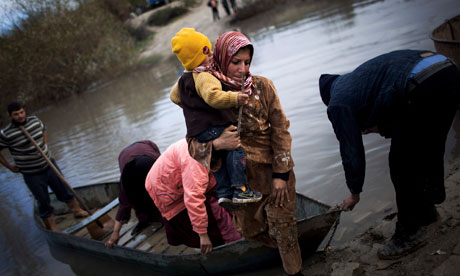
Syrian refugees arrive in Turkey via the Orontes river. Photograph: Manu Brabo/AP
Turkey contributed more than $1bn (£66m) in humanitarian aid last year, making it the fourth-largest government donor, highlighting the role of new countries in the aid landscape.
Turkey, which also received official development assistance, ranked behind only the US ($3.8bn), the EU ($1.9bn), and the UK ($1.2bn), according to the global humanitarian assistance report 2013, released by Development Initiatives (DI), a research group.
It is likely that a significant proportion of Turkey's contribution was spent on housing Syrian refugees within Turkey. The UN has appealed for $5.2bn to deal with the Syria crisis, where 6.8 million people are in need, including 1.6 million refugees and 4.25 million internally displaced people.
Last year governments gave $12.9bn for humanitarian assistance, defined as aid to save lives and ease suffering in the aftermath of emergencies such as drought or floods. The scale of humanitarian needs fell marginally, but the funding gap in the UN's consolidated appeal process (Cap), led by the Office for the Co-ordination of Humanitarian Affairs, was at its widest in more than a decade. Only $5.6bn of the $8.9bn funding requirement was met.
Pakistan, Somalia, and the West Bank and Gaza Strip received the most humanitarian assistance in 2011, the latest year for which figures exist. Pakistan received $1.4bn, Somalia $1.1bn, and the West Bank and Gaza Strip $849m. Many of the poorest countries provide humanitarian assistance by hosting refugees Pakistan hosted more than 1.7 million refugees in 2011, Kenya 567,000 and Chad 367,000.
DI urges donors to provide predictable multi-year funding for chronic crises; spend more on disaster preparation (still only 4.7% of the total in 2011) in close collaboration with governments of affected countries; focus on early response and the interconnectedness of risk; and promote access to information and better reporting.
Early intervention in Somalia could have saved lives, the report said. An estimated 257,000 Somalis (or 4.6% of the population) died of hunger between 2010 and 2012.
"The data shows that the response to slow-onset crises such as Somalia is often late, resulting in huge numbers of unnecessary deaths," said Judith Randel, executive director of DI. "By intervening earlier, as well as investing in mechanisms that reduce risk, donors could save more lives and protect more livelihoods probably at lower cost."
The latest UN appeal for Somalia plans for 2013-15, which DI says is a major advance on previous one-year appeals, and a step towards recognition that many humanitarian crises are acute manifestations of chronic problems and should be funded and managed accordingly.
The report outlines reforms to make humanitarian aid more effective, including more cash transfer schemes, a focus on resilience, greater access to information, and more investment in disaster prevention and preparedness. The EU has made cash and voucher programmes a priority and all European community humanitarian office food aid programmes in Haiti and Pakistan contain a cash or voucher element. Cash transfer programmes are intended to boost local markets.
The needs of older people and young children are not being catered for in humanitarian responses, according to a separate report by HelpAge International and Save the Children.
Of 2,800 project proposals submitted to the Cap, only 60 (2.1%) included at least one activity targeting older people and only 30 of these were actually funded, according to the report.
Only 2.3% of projects reached children under five. Of the 2,800 proposals submitted, 111 projects included at least one activity for under-fives and just 65 were funded. Humanitarian operations are not focused on meeting the specific needs of vulnerable population groups, according to the report.





